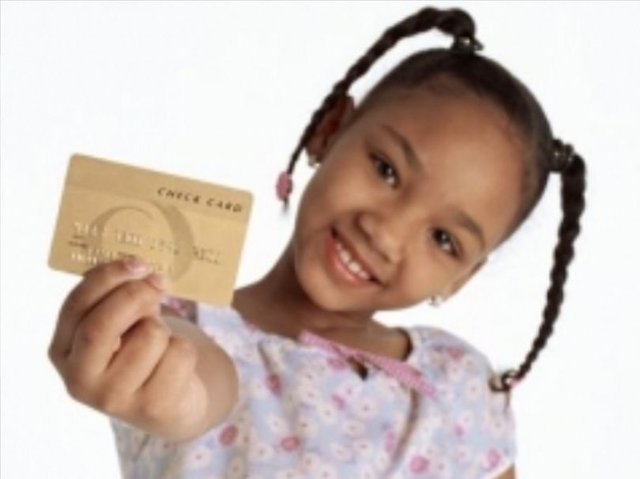Instead of talking to your children about credit cards - BECOME VISA!

I'm going to admit, it the sad truth. I'll be talking to my kids about major important stuff, stuff they must learn, stuff that will make them or break them in their adult life -- like credit cards. But, in the middle of my speech . . . in my own head . . . I hear my voice slowly turning into the Charlie Brown adult voice: "Wah, wah-wah, wah, wah-wah, wah . . ."
Man, if that's what my own voice sounds like to me, I can't imagine what type of information my kids are getting from my "sage words of wisdom." And let's face it, sixth grade and credit cards just don't mix well - seriously. Not when the latest Marvel Comic is in LIVE ACTION at the movies this weekend.
So what's the best way to teach your kids about credit cards and the dark hole they can dig themselves into when they cross over to the "dark side." (You know you've crossed over to the dark side when you apply for that credit card and get that plastic, right?)
Well, the best way to teach your kids about credit, is to give your kid a credit card. Yes, seriously. I gave each of my kids credit cards. But the catch was (cause there is always a catch) -- I became VISA. I've always wanted to be a banking giant.
Here's the break down of this learning exercise:
STEP 1. They work HARD for the money . . .
First, you must give your children a way to earn money. I set up a system where I list things I need done around the house and how much it pays . . . the list looks like:
- Break down all the boxes in the garage and set up for Recycling . . . $6
- Clean all the bathrooms . . . $15
- Clean out the pantry and organize food stuff . . . $7
- Clean out the refrigerator and make list of needed groceries . . . $15
- Weed the entire backyard . . . $20
- Go through all closets and clean out/put giveaways in boxes . . . $25
The list is prominently display on the refrigerator for all to see. The list changes bi-monthly. The rule is that you can't just take up a job. You must first be "hired" for the job. Which involves a quick written agreement outlining:
(1) exactly what I want done, (2) the agreed amount of compensation (salary) if successfully completed, (3) signature from both parties. (4) when the task is finished there is a final signed evaluation from supervisor (me or their father).
Good evaluations produces the entire compensation as agreed via signed contract. Poor performing and bad evaluations get a percentage of compensation (usually 50%).
Payment is made at the end of the week via an envelope of cash (this envelope has written information on it -- we'll talk about this on another post).
STEP 2. Don't leave home without it . . .
Meanwhile, before each child receives their paycheck/envelope, they would like cash for the movies, the mall, etc. Great, that's where their credit cards come in.
I sit each kid down and go over the CREDIT CARD agreement with them. Let them know that they can borrow from me (VISA), as long as they pay me back using their earnings. I carefully explain to them about minimum payments, interest rates, and maximum limits, etc. And I watch their eyes glaze over -- much like today's adult credit card holder.
Their eyes quickly un-glaze and sparkle when I slap the card in their hand. Each kid gets a credit card with their name on it. I tell them, again that they can borrow from me at any time. I give them a written document outlining everything I told them about minimum payments, limits, fees, charges etc.
When they need to borrow money from their earnings, they give me their credit card and I jot down next to their credit card number the amount and the date of the charge. And tally their charges and interest into a billing statement.
Step 3: The joy of pay-day and the agony of bills . . .
So at the end of the week, I give each kid two things. Their pay envelope with cold hard cash and their credit card bill due immediately. You should hear the gasps and moans. You should hear the urgent demands to now explain all those things that made their eyes glaze over just a few days ago.
Miraculously, they want to know all about MINIMUM payments, ACCOUNT balances, interest RATES, finance CHARGES (because they always overspend their limit, you know) and ultimately . . . (two or three weeks later) why their balance goes up even if they haven't charged anything and made payments each week!
It's amazing how math skills get so much sharper when it deals with labor and money. And quickly, your kids begin to realize how much labor it takes to get out of debt. A lesson most people learn in their 20s or 30s.
So, yeah you can sit down and talk to your kids about credit cards -- and watch the slow eye glazing affect your words have. Or you can take a little bit more effort to show them what credit is all about.

Post is from my blog: "Telecommuting Millionaire?"
yea we should
Brilliant! I have a 17 and 18 year old who I have recently tried to teach the incredible magic of compound interest. Time will tell whether they listen:)